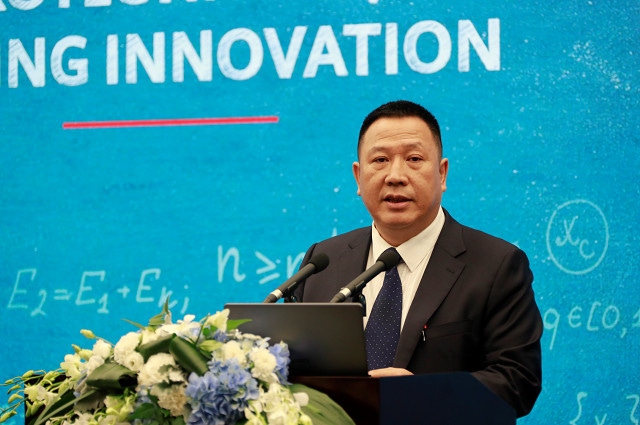Embattled telecoms vendor Huawei feels so passionately about the sanctity of intellectual property that it’s published a great big white paper on the matter.
June 27, 2019

Embattled telecoms vendor Huawei feels so passionately about the sanctity of intellectual property that it’s published a great big white paper on the matter.
Titled ‘Respecting and Protecting Intellectual Property: The Foundation of Innovation’, the paper goes on at great length about how important innovation is and how it can only happen if people don’t go around ripping off each other’s inventions. There’s even a whole five-page section stressing how much Huawei respects third party IP and would definitely never nick any of it.
The paper was unveiled at a press conference in China by Huawei’s Chief Legal Officer Song Liuping (pictured). “In the past 30 years, no court has ever concluded that Huawei engaged in malicious IP theft, and we have never been required by the court to pay damages for this,” he said.
“Innovation and IP protection is the cornerstone of Huawei’s business success. Last year we generated more than 100 billion dollars in revenue. None of our key products or technologies are linked to any accusations of IP theft. No company can become a global leader by stealing from others.
“We have grown because we invest. Last year alone, we invested 15 billion US dollars in R&D – the fifth largest in the world. We have more than 80,000 R&D engineers that put their hearts and souls into the technology we create. Huawei fully supports the IPR protection system, both globally and in the United States.”
That all seems pretty clear doesn’t it? The primary purpose of the paper, however, was not to protest possibly too much about Huawei’s innocence in such matters, but to indirectly berate US President Trump for using intellectual property as a political pawn.
“Over the past 30 years, we have paid more than 6 billion US dollars in royalties to legally implement the IP of other companies,” said Song. “Nearly 80% was paid to American companies…. Disputes over IP are common in international business. Huawei has been on both sides of these disputes. We believe these disputes should not be politicized. Intellectual property is private property, protected by the law, and disputes should be resolved through legal proceedings.”
Song makes several valid points here. As we recently covered, US attempts to co-opt its own companies into its political dispute with China are increasingly causing collateral damage. Furthermore the apparent suspension of the rule of law for Huawei is not only unjust, but undermines the whole foundation on which international trade relies.
Having said that, Huawei’s unprompted protestations of angelic innocence when it comes to intellectual property are likely to raise some eyebrows. For example, a recent investigation into Huawei’s historical activities in this area paints a somewhat more nuanced picture. Huawei is using MWC Shanghai to issue another round of self-aggrandizing announcements, but the real action will take place when Trump meets Chinese President Xi in Japan this weekend, with the trade war at the top of the agenda.
About the Author(s)
You May Also Like








.png?width=300&auto=webp&quality=80&disable=upscale)


_1.jpg?width=300&auto=webp&quality=80&disable=upscale)


.png?width=800&auto=webp&quality=80&disable=upscale)